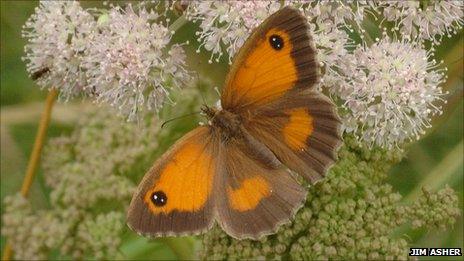Cold summer blamed for low Big Butterfly Count numbers
- Published

Gatekeeper butterflies were the most commonly seen UK species
The coldest summer for 18 years has been blamed by conservationists for an 11% fall in butterflies seen during this year's Big Butterfly Count.
More than 34,000 people took part in the survey and recorded 322,000 butterflies and day-flying months.
The gatekeeper butterfly was seen the most, while numbers of common blue were down by 61% on last year's figures.
Butterfly Conservation said eastern Scotland was among the areas worst hit by cold and wet weather.
The charity had expected a bumper count after a warm and dry spring.
But temperatures dropped and there were prolonged spells of rain.
According to the Met Office, external, 2011 had coolest June across the UK since 2001, the coolest July since 2000 and the coolest August since 1993.
It said the season was the coolest since summer 1993 with only about 10 days when the temperature exceeded 25C widely.
Butterfly Conservation said insects' activity was impaired by low temperatures and heavy rain.
Moths and butterflies are unable to fly, feed, find mates or lay eggs during bad weather.
Richard Fox, Butterfly Conservation surveys manager said: "The fantastic response of the UK public to Big Butterfly Count 2011 has given us a detailed snapshot of how butterflies fared this summer. Twice as many counts were carried out this year as in 2010.
"Unfortunately, the results show that it was a poor summer for butterflies with many species showing declines compared to last year.
"The dismal summer weather, the coldest for 18 years, is undoubtedly to blame, although many butterflies have suffered long-term declines as a result of destruction of their habitats by human activities."
He added: "In bad summers, butterflies need all the help they can get from people to maintain their breeding areas."
The gatekeeper was the most commonly seen species this year, up three places from 2010, but numbers of butterfly were also down by 12%.
The survey also suggested that numbers of small tortoiseshell stabilised during 2011 after a severe decline.
Three times as many small tortoiseshells were recorded per count in Scotland than in England.
Red admirals enjoyed a "fantastic" summer with numbers up by 98%, Butterfly Conservation said.
- Published13 June 2011